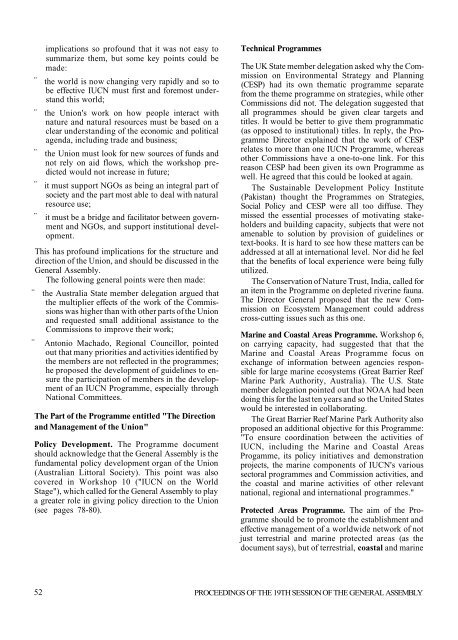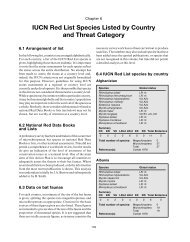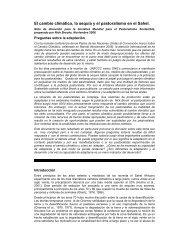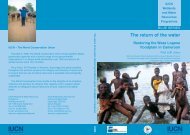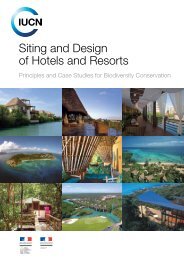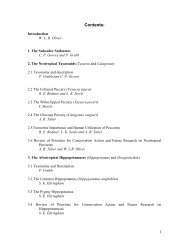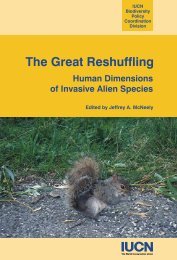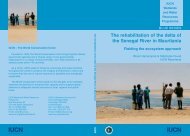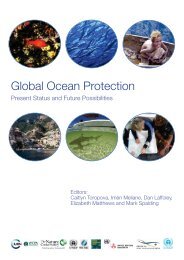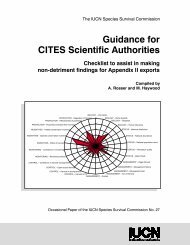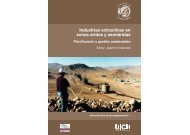Buenos Aires, Argentina - IUCN
Buenos Aires, Argentina - IUCN
Buenos Aires, Argentina - IUCN
Create successful ePaper yourself
Turn your PDF publications into a flip-book with our unique Google optimized e-Paper software.
¤<br />
¤<br />
¤<br />
¤<br />
¤<br />
implications so profound that it was not easy to<br />
summarize them, but some key points could be<br />
made:<br />
the world is now changing very rapidly and so to<br />
be effective <strong>IUCN</strong> must first and foremost understand<br />
this world;<br />
the Union's work on how people interact with<br />
nature and natural resources must be based on a<br />
clear understanding of the economic and political<br />
agenda, including trade and business;<br />
the Union must look for new sources of funds and<br />
not rely on aid flows, which the workshop predicted<br />
would not increase in future;<br />
it must support NGOs as being an integral part of<br />
society and the part most able to deal with natural<br />
resource use;<br />
it must be a bridge and facilitator between government<br />
and NGOs, and support institutional development.<br />
This has profound implications for the structure and<br />
direction of the Union, and should be discussed in the<br />
General Assembly.<br />
The following general points were then made:<br />
¤ the Australia State member delegation argued that<br />
the multiplier effects of the work of the Commissions<br />
was higher than with other parts of the Union<br />
and requested small additional assistance to the<br />
Commissions to improve their work;<br />
¤<br />
Antonio Machado, Regional Councillor, pointed<br />
out that many priorities and activities identified by<br />
the members are not reflected in the programmes;<br />
he proposed the development of guidelines to ensure<br />
the participation of members in the development<br />
of an <strong>IUCN</strong> Programme, especially through<br />
National Committees.<br />
The Part of the Programme entitled "The Direction<br />
and Management of the Union"<br />
Policy Development. The Programme document<br />
should acknowledge that the General Assembly is the<br />
fundamental policy development organ of the Union<br />
(Australian Littoral Society). This point was also<br />
covered in Workshop 10 ("<strong>IUCN</strong> on the World<br />
Stage"), which called for the General Assembly to play<br />
a greater role in giving policy direction to the Union<br />
(see pages 78-80).<br />
Technical Programmes<br />
The UK State member delegation asked why the Commission<br />
on Environmental Strategy and Planning<br />
(CESP) had its own thematic programme separate<br />
from the theme programme on strategies, while other<br />
Commissions did not. The delegation suggested that<br />
all programmes should be given clear targets and<br />
titles. It would be better to give them programmatic<br />
(as opposed to institutional) titles. In reply, the Programme<br />
Director explained that the work of CESP<br />
relates to more than one <strong>IUCN</strong> Programme, whereas<br />
other Commissions have a one-to-one link. For this<br />
reason CESP had been given its own Programme as<br />
well. He agreed that this could be looked at again.<br />
The Sustainable Development Policy Institute<br />
(Pakistan) thought the Programmes on Strategies,<br />
Social Policy and CESP were all too diffuse. They<br />
missed the essential processes of motivating stakeholders<br />
and building capacity, subjects that were not<br />
amenable to solution by provision of guidelines or<br />
text-books. It is hard to see how these matters can be<br />
addressed at all at international level. Nor did he feel<br />
that the benefits of local experience were being fully<br />
utilized.<br />
The Conservation of Nature Trust, India, called for<br />
an item in the Programme on depleted riverine fauna.<br />
The Director General proposed that the new Commission<br />
on Ecosystem Management could address<br />
cross-cutting issues such as this one.<br />
Marine and Coastal Areas Programme. Workshop 6,<br />
on carrying capacity, had suggested that that the<br />
Marine and Coastal Areas Programme focus on<br />
exchange of information between agencies responsible<br />
for large marine ecosystems (Great Barrier Reef<br />
Marine Park Authority, Australia). The U.S. State<br />
member delegation pointed out that NOAA had been<br />
doing this for the last ten years and so the United States<br />
would be interested in collaborating.<br />
The Great Barrier Reef Marine Park Authority also<br />
proposed an additional objective for this Programme:<br />
"To ensure coordination between the activities of<br />
<strong>IUCN</strong>, including the Marine and Coastal Areas<br />
Progamme, its policy initiatives and demonstration<br />
projects, the marine components of <strong>IUCN</strong>'s various<br />
sectoral programmes and Commission activities, and<br />
the coastal and marine activities of other relevant<br />
national, regional and international programmes."<br />
Protected Areas Programme. The aim of the Programme<br />
should be to promote the establishment and<br />
effective management of a worldwide network of not<br />
just terrestrial and marine protected areas (as the<br />
document says), but of terrestrial, coastal and marine<br />
52 PROCEEDINGS OF THE 19TH SESSION OF THE GENERAL ASSEMBLY


